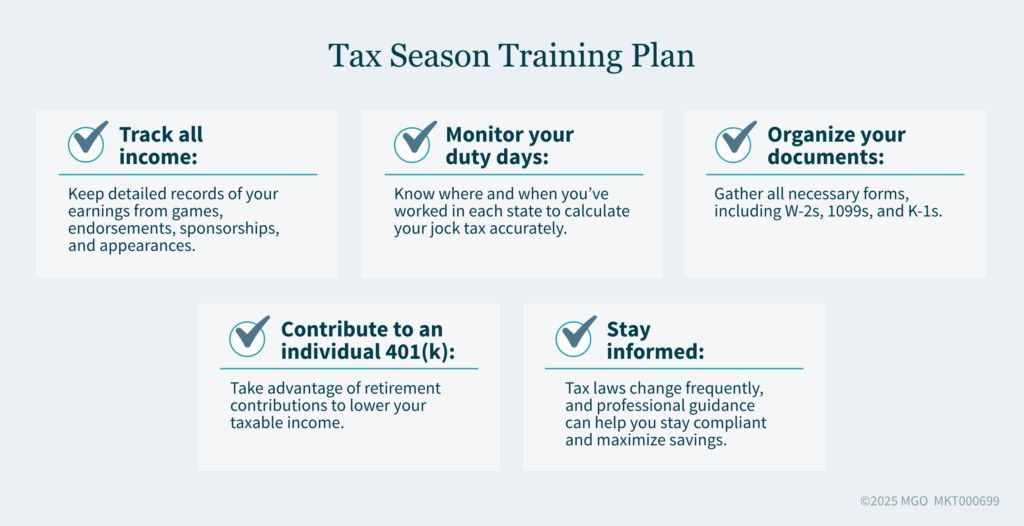- in South America
- within Criminal Law, Strategy and Family and Matrimonial topic(s)
- with Finance and Tax Executives
Key Takeaways:
- Pro athletes can minimize tax stress by approaching tax planning like off-season conditioning — preparing year-round to streamline filing.
- Navigating the "jock tax" requires filing income taxes in multiple states where games are played, adding complexity to tax obligations.
- Contributing to a retirement account can help reduce taxable income during peak earning years while building long-term financial security.
Just like every professional sport has a season and an off-season, so do taxes. Tax season is the period between January and April each year when you file your income taxes. Now that tax season is over, how can you get in better shape through planning and preparation for next year?
Unfortunately, too many professional athletes make the mistake of only thinking about taxes when the deadline looms. That's like showing up to the first game of the season without putting in the conditioning work beforehand — you're not setting yourself up to play your best.
Whether you're just starting your career or you're already a veteran, taking a strategic approach to tax planning will save you stress and money when it's time to file. Let's break down some key strategies to make tax season a win.
Take Advantage of Tax Planning
Think of tax planning and tax filing like training versus competing. Filing your taxes is game day — it's about reporting what happened during the past year and making sure everything is accurate and compliant. Tax planning, on the other hand, is the off-season work — it's about making strategic moves to minimize your tax burden before it's time to file.
Tax filing is straightforward but time sensitive. You're preparing and submitting your tax return to the IRS and any state(s) where you have a tax obligation — reporting your income, deductions, and credits from the previous year. You calculate the amount you owe or your refund and make sure you hit deadlines. It's a backward-looking process, reviewing what happened last year and getting everything in order to stay compliant.
Tax planning is where you take control. It's all about strategizing throughout the year to reduce your overall tax bill. You're making choices about timing income and expenses, leveraging retirement accounts, and even factoring in the different states where you play. It's a forward-looking process, keeping your financial future in mind.
Pro Tip: Treat tax planning like off-season conditioning — put in the work year-round to make filing faster and more efficient.

Understand Your State and Local Tax Obligations
One of the most challenging parts of filing your taxes as a pro athlete is navigating the "jock tax." This tax requires you to pay income taxes not only in your home state but also in each state and city where you play games. It's calculated based on "duty days" — any day you spend working (including practices, games, and team meetings) in each locality.
The concept of the jock tax took off in 1991 when California targeted Michael Jordan and the Chicago Bulls after they defeated the Los Angeles Lakers in the NBA Finals. Illinois then retaliated with its own tax on visiting athletes and the practice quickly spread nationwide. Today, almost every state imposes some form of jock tax.
How does the jock tax affect you? Let's say you're based in Florida (a state with no income tax), but you play games in New York, California, and Texas. You'll be filing state tax returns for each of those states, and the tax you owe will be calculated based on how many duty days you spent in each place. The administrative burden of filing in multiple states can be overwhelming — not to mention the risk of double taxation if you're not careful about claiming credits in your home state for taxes paid elsewhere.
Where you choose to live can significantly impact your overall tax liability. States like Florida, Nevada, Tennessee, and Texas don't have a state income tax, making them attractive for athletes looking to minimize their tax bills. But it's essential to be strategic, as moving your primary residence is a major decision with plenty of financial implications.
Pro Tip: Work with a tax professional who understands multi-state filings and can help you navigate the jock tax maze. The last thing you want is to overlook a state return and face hefty penalties down the road.
Make Retirement Contributions Part of Your Tax Strategy
One of the smartest tax planning moves you can make as a pro athlete is contributing to a retirement account. Your contributions can lower your taxable income while helping secure your financial future.
Depending on your situation, there are several tax-advantaged options to explore. If you're self-employed or have endorsement income, an individual 401(k) or a SEP IRA could allow you to contribute large amounts and defer taxes until retirement. If you're part of a league with a pension plan, those contributions may be made on your behalf — but supplementing them with your own traditional or Roth IRA can give you more flexibility and control.
For athletes, whose peak earning years are often short, retirement accounts are invaluable tools. The tax savings can be substantial, especially in high-earning years. Plus, having a well-funded retirement plan gives you peace of mind for life after your career winds down.
Pro Tip: Maximize your contributions in years when your earnings are highest. This can help offset the impact of the jock tax by reducing the income subject to taxation.
Ready to Get in Tax Season Shape?
Taking a proactive approach to your taxes means less stress, fewer surprises, and more savings when it's time to file. Just like conditioning in the off-season sets you up for success on game day, putting in the effort now will help prepare you when the whistle blows on the next tax season.

The content of this article is intended to provide a general guide to the subject matter. Specialist advice should be sought about your specific circumstances.


